The AI Book Description Generator Advantage
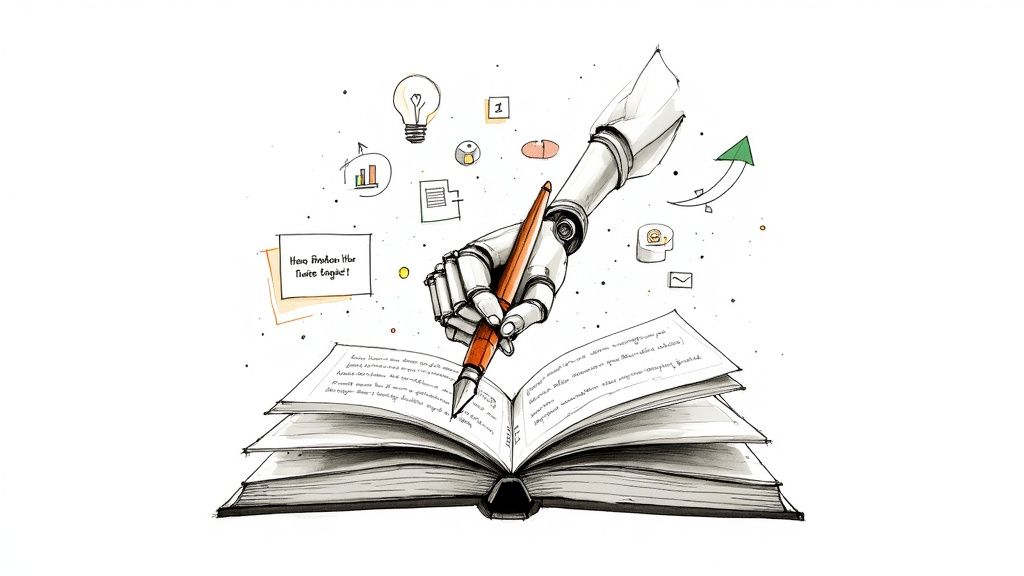
Ever found yourself staring at a blank page, trying to distill your 80,000-word masterpiece into a compelling 150-word blurb? You're not alone. This is where a book description generator comes in, and it's more than just a fancy new gadget—it's a powerful tool for authors and publishers.
In simple terms, it's an AI-powered assistant that crafts engaging book summaries for you. You feed it the key details of your story—genre, a few plot points, character names, and the overall mood—and it generates marketing copy in just a few moments. This frees you up to do what you do best: write your next book.
What Is an AI Book Description Generator
Think of it this way: you have an expert copywriter on call, 24/7. This isn't just a machine spitting out random words. A good book description generator acts more like a creative partner, one who's already an expert in your genre and understands what makes readers click that "buy now" button.
These tools are built on sophisticated technology that analyzes the core of your story—the plot twists, the hero's journey, the tone, and the underlying themes. It then pieces together a description designed to stand out on crowded digital shelves like Amazon. The underlying magic is a field known as artificial intelligence, and for authors, it’s about gaining a serious competitive edge.
How These Tools Are Changing the Game
The arrival of these AI tools is genuinely changing how authors approach book marketing. By using advanced language models, they can produce summaries that are not just well-written but also optimized for online stores.
This isn't just about saving time; it's about seeing real results. Some industry reports even show authors boosting their conversion rates by as much as 25% after adopting these tools. For a deeper dive, check out our ultimate guide on AI book description generators.
The process itself is refreshingly simple. As you can see in the screenshot below, you just provide the raw ingredients of your story to get a polished output.
The goal is to eliminate the friction between your brilliant story idea and a professional-grade blurb. You no longer need to be a copywriting wizard to create marketing materials that sell.
A book description generator offers a host of advantages that can make a real difference in an author's marketing efforts. Let's break down the most impactful ones.
Core Benefits of Using a Book Description Generator
| Benefit | Impact for Authors |
|---|---|
| Time Savings | Frees up hours of creative energy, allowing you to focus on writing your next book instead of agonizing over marketing copy. |
| Overcoming Writer's Block | Provides fresh ideas and different angles for your blurb, helping you break through creative barriers when you're too close to the story. |
| Genre Optimization | Creates descriptions that hit all the right notes for your specific genre, using hooks and language that resonate with your target audience. |
| Increased Conversions | A well-crafted, persuasive description can directly lead to more sales by turning casual browsers into loyal readers. |
| Consistency | Ensures your marketing message is consistent across all platforms, from your Amazon page to your social media posts. |
Ultimately, integrating a tool like this into your workflow isn't about replacing your creativity—it's about amplifying it. It handles the heavy lifting of copywriting so you can concentrate on the art of storytelling.
How To Choose the Right AI for Your Book

Let's be honest: not all AI tools are built the same. With the explosion of AI writers, picking the right one can feel a lot like trying to find one specific book in a library the size of a city. The secret is to look beyond the basic text generation and focus on the features that will actually make a difference for your book sales.
Think of it like hiring an assistant. You wouldn't just hire the first person who walked in; you'd look for someone with specific skills. A truly effective book description generator is more than just a word machine. It's a partner that gets the art of storytelling and the science of online book retail.
As you weigh your options, getting a broader perspective on what is the best AI for writing can offer some valuable insights that apply to description generators, too.
Features That Truly Matter
To find an AI that’s a good fit, you need to know what to look for. Certain capabilities are what separate a mildly helpful gadget from a genuinely powerful marketing ally.
Here's what should be on your checklist:
- Genre-Specific Tone: Can the tool tell the difference between a pulse-pounding thriller and a heartwarming romance? You need an AI that can craft a suspenseful blurb for your mystery without accidentally making it sound like a goofy comedy.
- SEO Keyword Integration: The best generators don't just stuff keywords in. They help you weave them into the text naturally. This is crucial for boosting your book's visibility on Amazon and getting it in front of readers who are already looking for a story just like yours.
- Multiple Versions: One of my favorite features is the ability to get several unique descriptions from a single prompt. This lets you A/B test different blurbs on your website, ads, or social media to see which one actually gets people to click "buy now."
Ultimately, picking the right book description generator comes down to finding a tool that complements your voice and your marketing plan. Look for an AI that gives you control, customization, and features built specifically with authors in mind. Your AI should be a co-pilot, helping you navigate, not an autopilot that takes over the controls completely.
How to Craft Prompts for Better Blurbs
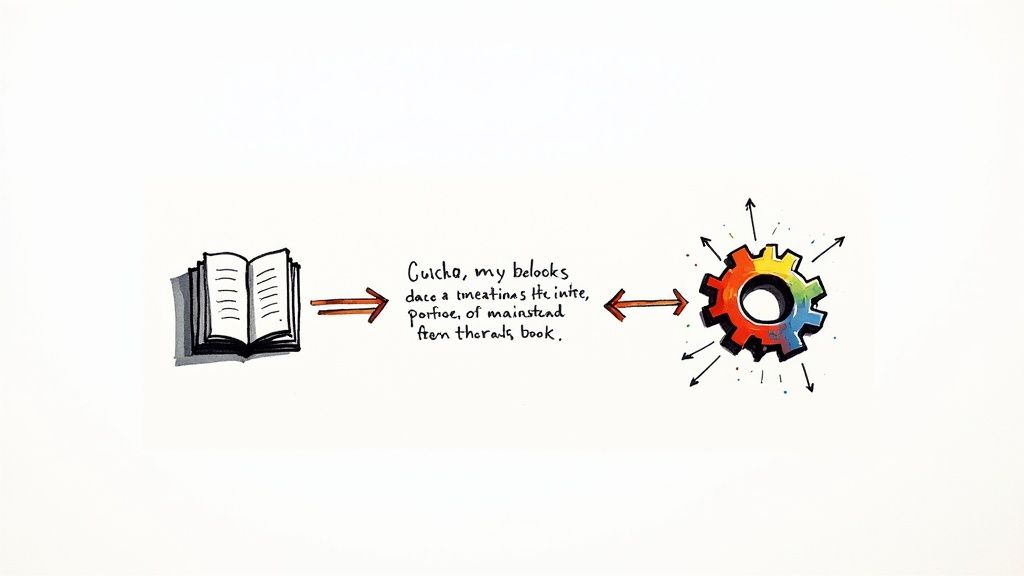
The real secret to getting a fantastic blurb from a book description generator has nothing to do with magic and everything to do with communication. The quality of what you get out is a direct reflection of the quality of what you put in.
Think of the AI as an incredibly skilled co-writer who knows nothing about your book. You wouldn't just hand a collaborator a one-sentence summary and expect them to nail the back-cover copy, right? You need to give them the good stuff—the context, the emotion, and the soul of your story.
Building a Richer Prompt
To get the AI to really shine, your prompt needs to be more than just a plot summary. A generic prompt will always spit out a generic blurb. We want something that sings.
Here are the key ingredients that I've found make all the difference:
- Character Archetypes: Don't just give the AI a name. Instead, try "a jaded ex-detective haunted by one last unsolved case" or "a brilliant but socially awkward scientist on the verge of a world-changing discovery." This gives the AI personality to work with.
- Central Conflict & Stakes: Be crystal clear about the main problem and, crucially, what happens if the hero fails. For instance, "She must crack the ancient code before a rival corporation unleashes a bio-weapon."
- Emotional Hooks: What do you want your reader to feel? Tell the AI to aim for "heart-pounding suspense," "a tender, slow-burn romance," or "a gut-punching, emotional journey."
- Target Audience Details: Who is this book for? Specifying "for fans of Andy Weir and Blake Crouch" gives the tool powerful stylistic clues and helps it find the right voice for your genre.
The better your input, the better your results. Your goal is to give the AI all the pieces it needs to assemble a blurb that feels both authentic to your story and irresistible to your ideal reader.
When you nail the prompt, the book description generator stops being a simple tool and starts feeling more like a true creative partner. While the AI handles the heavy lifting of assembly, you can dive deeper into the art of the blurb with these essential tips for crafting a bestselling book blurb.
Your AI-Powered Publishing Workflow
Let’s be clear: getting an AI draft from a book description generator is a brilliant first step, but it’s definitely not the finish line. The real magic happens when you weave this powerful tool into your own smart, human-driven workflow.
Think of the AI as your creative partner. It does the heavy lifting and gets a solid draft on the page, but you’re still the author. You’re the one who guides the final piece, ensuring it has heart, soul, and your unique voice. The AI provides the blueprint, but you build the house. This partnership is how you end up with a blurb that feels authentic, hits all the right emotional notes, and genuinely hooks your ideal readers.
This simple diagram shows the three core steps for taking your book's details and turning them into a polished, ready-to-publish description.
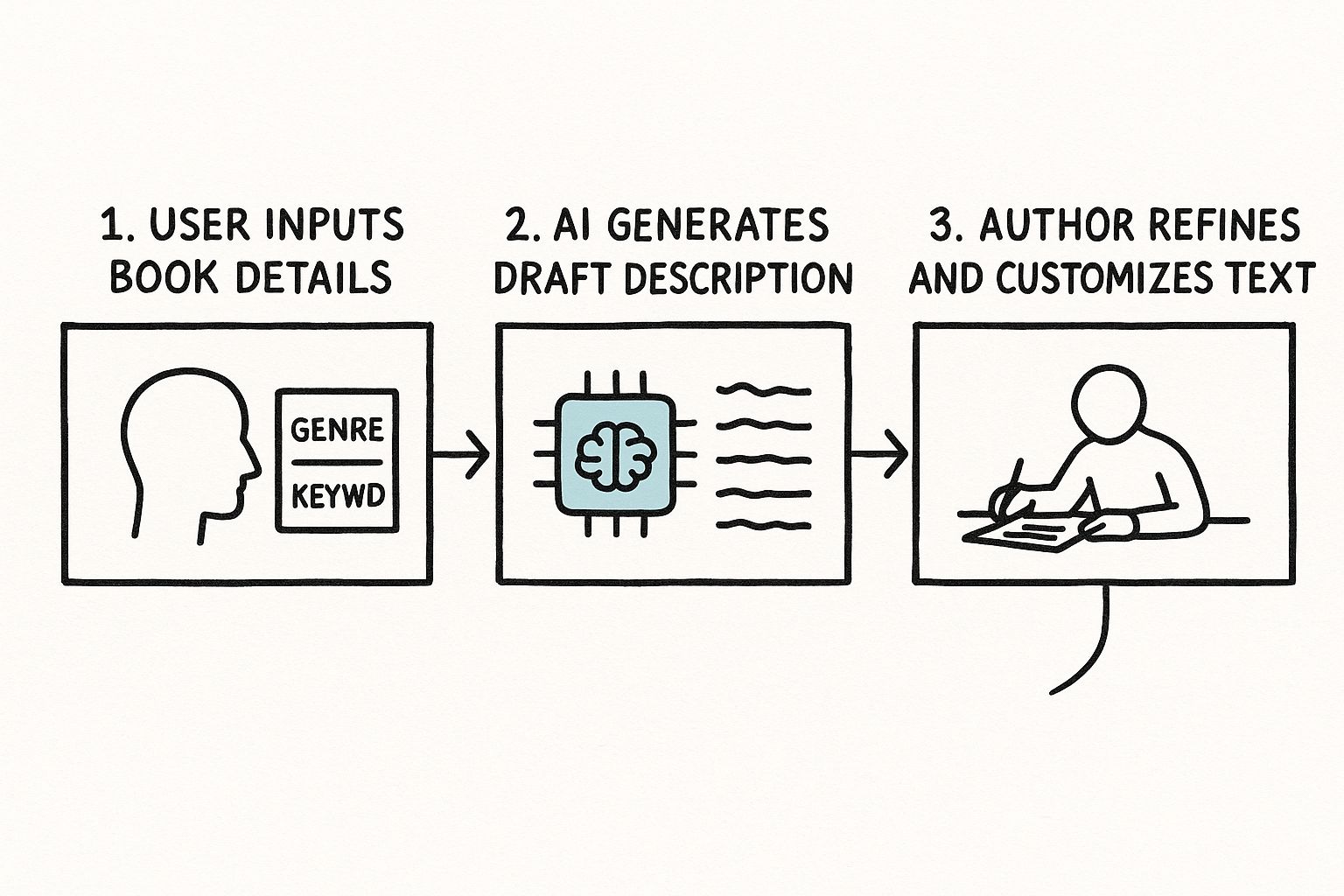
As you can see, the process flows from your input to the AI's generation. But that last step—your final refinement—is what makes all the difference. It's where your personality shines through and guarantees the copy is a perfect match for your story.
From Generation to Publication
Once you've nailed the wording, there's one last hurdle: making sure it looks good on the digital bookshelf. A great description can be ruined by bad formatting. Nothing sends a potential reader running faster than a giant, intimidating "wall of text," especially on a crowded marketplace like Amazon.
AI for Content Creation is a massive field. Knowing how these tools fit into your bigger marketing picture gives you a real strategic advantage.
Thankfully, you don't have to wrestle with HTML to get it right. Because Amazon is so dominant, a whole cottage industry of formatting tools has popped up. These visual description editors give you a "what-you-see-is-what-you-get" (WYSIWYG) preview of how your blurb will look on the live product page.
With just a few clicks, you can add bold text, create bullet points, and fix spacing issues. The result is a clean, professional, and inviting description that actually encourages people to read on.
This final polish is what separates an amateur-looking listing from a book page that screams "bestseller."
Common Mistakes to Avoid with AI Tools
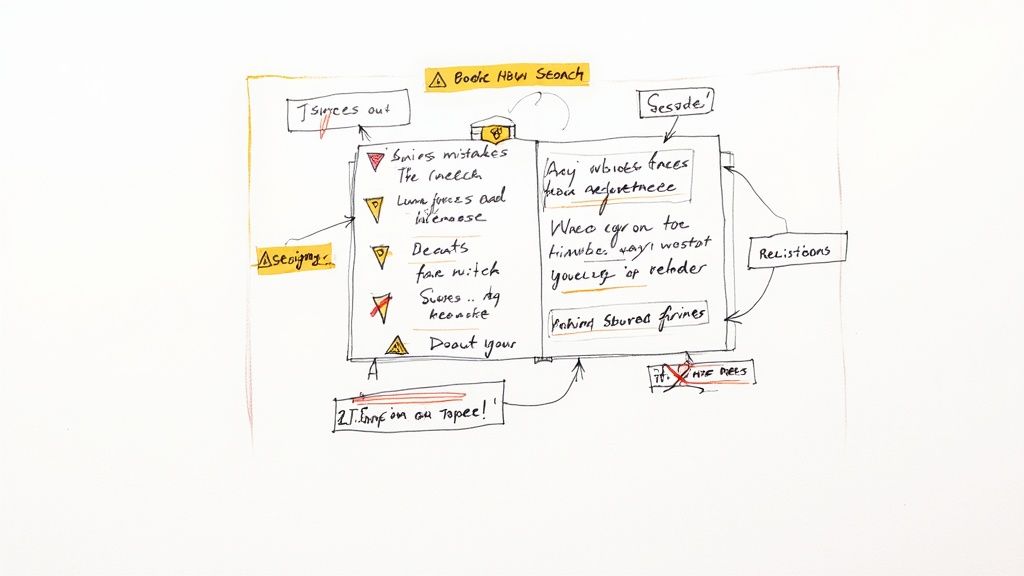
While a book description generator can feel like a magic wand for writers' block, treating it like an infallible genius is a trap many authors fall into. It’s a powerful assistant, absolutely, but it's not perfect. Steering clear of a few common mistakes can make all the difference between a blurb that captivates and one that gets scrolled past.
The most frequent misstep? Relying completely on the first draft. Just copying and pasting what the AI spits out is a recipe for a bland, soulless description that sounds like it could be for any book. Your novel has a unique voice—the AI gives you a great starting point, but it's up to you to infuse it with personality.
Checking for Accuracy and Authenticity
You also have to put on your detective hat and check the facts. AI tools can sometimes "hallucinate" details, meaning they invent things or get key plot points completely wrong. Just imagine a blurb that misrepresents your hero's core motivation or adds a twist that doesn't exist. For a potential reader, that's an immediate red flag.
Finally, you need to be ruthless about clichés. Because AI learns from the vast ocean of existing text online, it can easily lean on tired, overused phrases. Your book deserves better than to sound like a dozen others on the shelf.
A great blurb feels fresh and specific. Your goal is to use the AI's output as a base, then swap out any generic language for words that are uniquely yours and true to your story's tone.
When you avoid these pitfalls, you can turn a good AI-generated draft into an exceptional marketing tool that truly sells your story. It’s about working smarter, not just handing over the reins. Using these tools well is a vital part of any promotional plan, and you can learn more about how to market a self-published book in our full guide. Ultimately, your final description must be accurate, authentic, and a powerful reflection of your hard work.
Your Questions About AI Generators, Answered
New tools always bring up good questions. I hear from authors all the time who are curious—and maybe a little skeptical—about using a book description generator. So, let's clear the air on a few of the most common concerns.
Think of these generators as a powerful new assistant, not a replacement for your own creativity. Understanding how to work with them is the key.
Can an AI Really Capture My Unique Voice?
This is the big one, and the honest answer is: not by itself. And that's actually a good thing. What an AI generator does brilliantly is lay the groundwork. It can draft a blurb that’s structurally solid and hits all the right notes for your genre, giving you a fantastic starting point.
From there, you step back in. As the author, you’ll take that solid draft and weave in your unique style, the specific emotional beats of your story, and the nuances that make your voice yours.
Think of the AI as a talented apprentice. It builds a sturdy, well-designed bookshelf, but you're the one who fills it with your treasured stories and personal touches. The structure is sound; the final magic comes from you.
This partnership is what makes the final description both compelling for readers and authentic to you.
Is It Cheating to Use a Generator?
Absolutely not. Is it cheating to use Grammarly to catch typos? To hire a cover designer to create an amazing visual? Of course not. An AI generator is just one more tool in the modern author's toolkit.
These resources are all about making the business of being an author more efficient so you can focus on the writing. You’re still the one providing the creative direction and signing off on the final blurb. The AI is a collaborator, not the creator.
Do I Need to Be a Tech Whiz to Use These?
Not in the slightest. If you can type in a search bar or fill out an online form, you've got all the technical skills you need. The best book description generators are designed to be incredibly straightforward.
You'll simply be prompted to enter the core details of your story:
- Your book's genre
- Who your main characters are and what they're up against
- The key events that drive the plot
- The overall tone you're going for
Your expertise is your story, not software. The tool just needs your creative input to do its job.
Complete AI Blurb Writing Resource Library
This comparison guide is part of our comprehensive AI blurb writing series. Explore these related resources to master every aspect of AI-powered book marketing:
🏆 Top Recommendations: New to AI blurb tools? Start with our best AI tool for book blurbs guide featuring detailed reviews, case studies, and ROI analysis of the leading platforms.
🔧 Technical Understanding: Want to understand how these tools actually work? Our AI book description generator technical guide explains the algorithms, processes, and optimization strategies in detail.
🎯 Practical Implementation: Ready to create your first AI blurb? Our hands-on auto-generate guide walks you through prompt engineering and real-world examples you can try immediately.
Together, these guides provide everything you need to leverage AI for more effective book marketing while preserving your unique authorial voice.
Ready to see what your manuscript can do? In just minutes, ManuscriptReport.com can generate your blurbs, keywords, ad copy, and social media content, all from your text. Get your complete marketing report at ManuscriptReport.com and get back to what you do best—writing.
Related Articles

6 Essential Book Marketing Strategies for Romance Novels
Discover 6 proven strategies to market your romance novel effectively and boost sales.

7 Essential Book Giveaway Strategies to Build Loyalty
Discover 7 essential book giveaway strategies to boost reader loyalty and engagement.
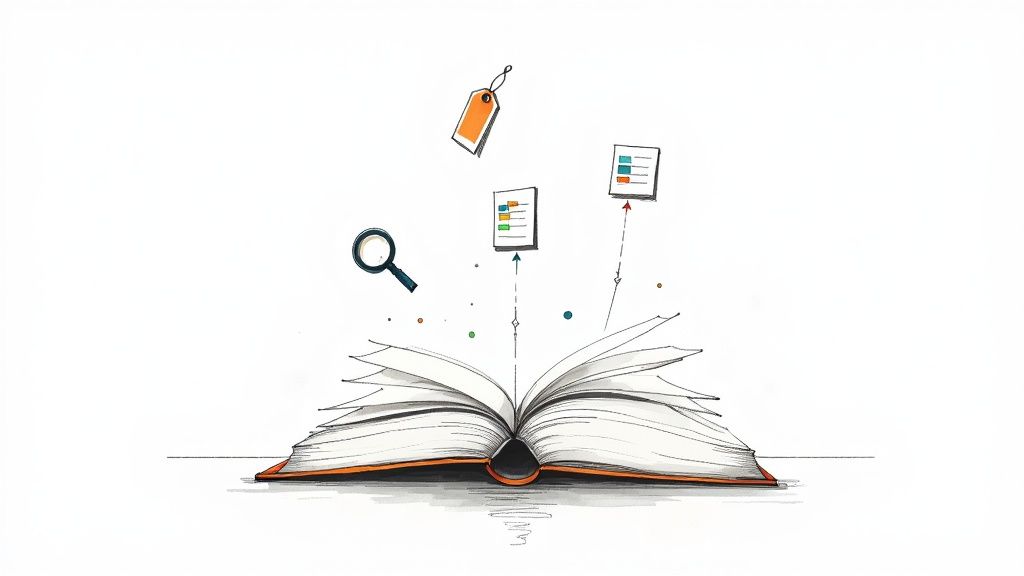
Top Affordable Book Marketing Services for Authors 2025
Explore our list of affordable book marketing services to help authors boost visibility and sales without breaking the bank. Find your ideal option today!